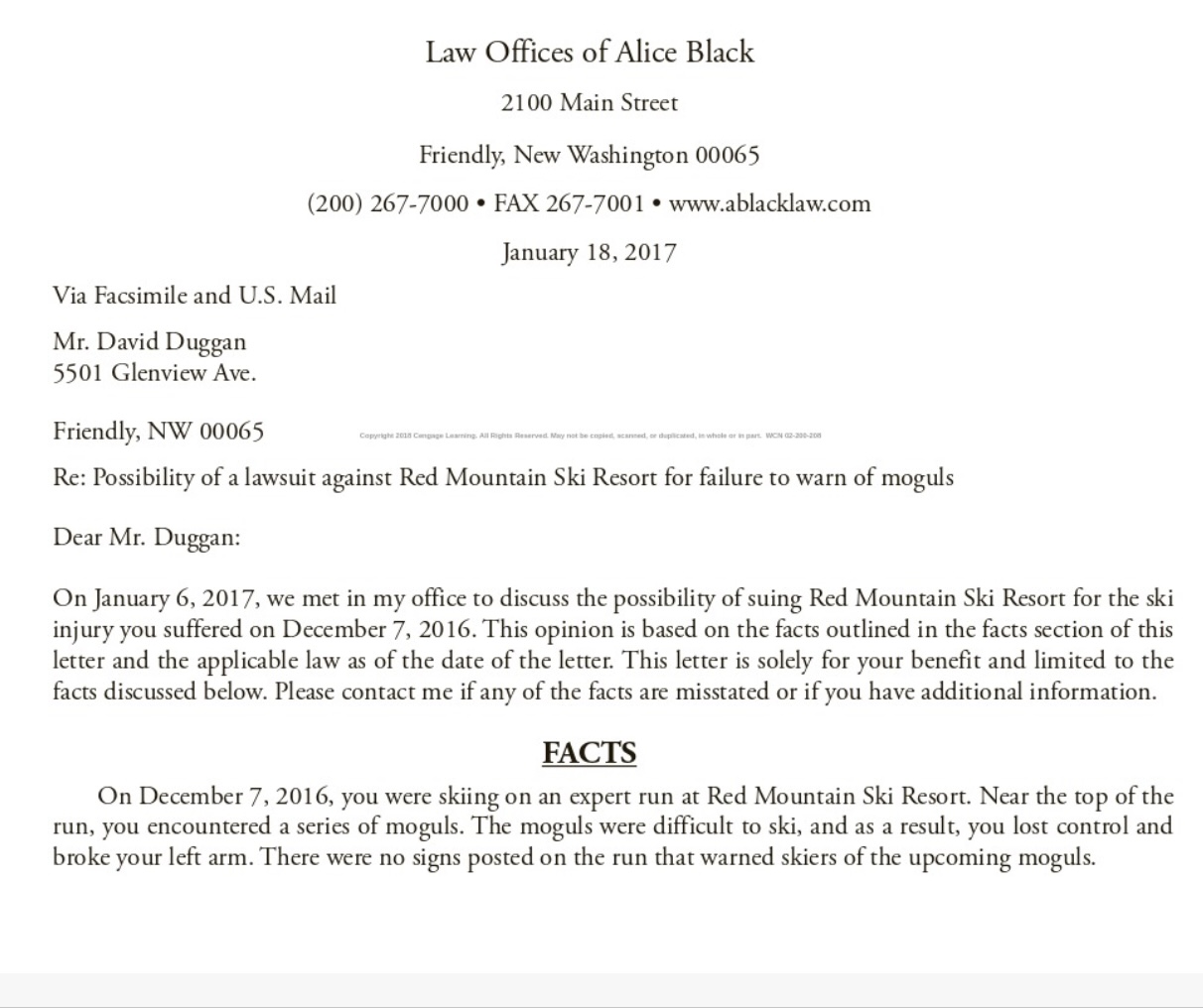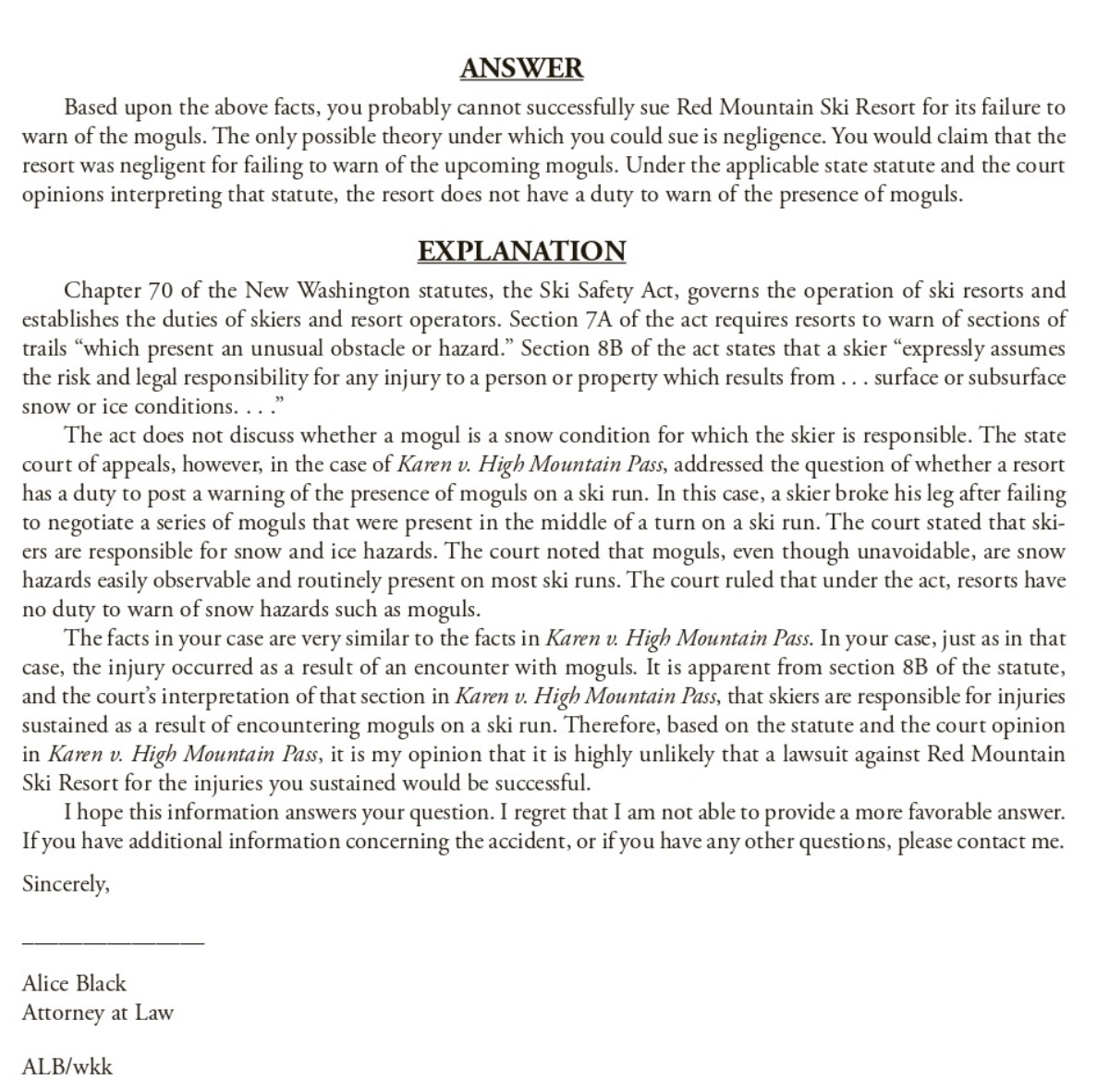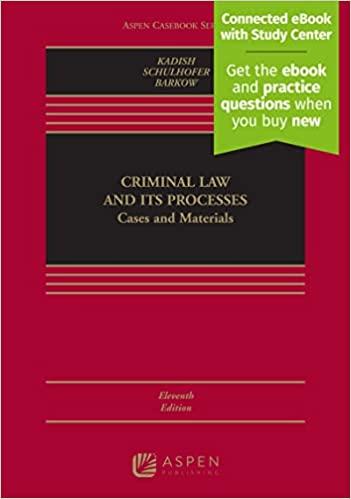Question
How would you construct this opinion letter under the format with the attached document below? The assignment is drafting an opinion letter to Mr. Smart
How would you construct this opinion letter under the format with the attached document below?
The assignment is drafting an opinion letter to Mr. Smart informing him of the results of the research on the question of whether Mr. Carpenter is in violation of the restrictive covenants.
The letter is to Mr. Michael Smart, President, River View Home Owners Association, 1200 River View Road, Friendly, New Washington 00065. The date is today's date.
The Research Details:
ISSUE Under the Pennsylvania law governing restrictive covenants, is a restrictive covenant violated when the covenant restricts the use of lots to residential purposes and the owner of a lot parks and performs minor maintenance on two business vehicles on the lot? BRIEF ANSWER Yes. In the case of Baumgardner v. Stuckey, 735 A.2d 1272 (Pa. Supr. 1999), the court held that the storage of a tractor- trailer at the defendant's residential property was commercial in nature and violated the covenant requirement that the property be used solely for residential purposes. In our case, Mr. Carpenter's parking of his welding trucks at his residence when not in use is commercial in nature and violates the covenant restricting the use of the property to residential purposes.
FACTS Last year, Mr. Gordon Carpenter purchased a home in the River View Subdivision. The subdivision is subject to the covenants and restrictions contained in the Declaration of Covenants, Conditions, and Restrictions of River View Subdivision, recorded on June 1, 2001. The relevant portions of the covenants and restrictions provide as follows: The following covenants and restrictions shall run with the land and shall bind the purchasers, their heirs, successors and assigns, until abrogated by a duly recorded agreement executed by the owners of a majority of the residential lots affected by the restrictions. 1. USE. No lot shall be used except for residential purposes. No commercial or business activity shall be conducted within the Subdivision with the exception of a personal home office. The deed to the property that Mr. Carpenter purchased includes a notation that the property is subject to the Covenants, Conditions, and Restrictions of River View Subdivision. Mr. Carpenter operates a welding business. When they are not in use, he parks two of his 1.5- ton welding trucks on a large parking area he has cleared next to his residence. He uses the trucks solely in conjunction with his business. At the residence, Mr. Carpenter performs routine maintenance and minor repairs on the trucks. Mr. Michael Smart, acting as president of the home owners association, advised Mr. Carpenter that parking the trucks on the property violates the restrictive covenant regulating the use of the property. Mr. Carpenter refuses to stop parking the trucks at his property. The property is located in the state of Pennsylvania.
ANALYSIS The relevant law concerning restrictive covenants is presented in Jones v. Park Lane for Convalescents, 384 Pa. 268, 120 A.2d 535 (1956). In that case, the court noted that land-use restrictions are not favored, are strictly construed, and no act will be deemed a violation of a restriction that is not in plain disregard of its express words. This summary of the law does not give guidance as to how the law applies in fact situations such as those presented in the client's case. A court opinion that does provide guidance is Baumgardner v. Stuckey, 735 A.2d 1272 (Pa. Supr. 1999). In Stuckey, the defendant, Mr. Stuckey, purchased residential property in a property development that was governed by restrictive covenants. One covenant provided that no lot could be used except for residential purposes. Mr. Stuckey, a truck driver, parked his truck tractor and one or more trailers on the property when they were not in use. He also performed repairs on the truck-tractor on the property. The plaintiffs, the Baumgardners, representing the Architectural Control Committee of the development, sought injunctive relief against Mr. Stuckey claiming that the parking of the tractor-trailer on the property violated the restrictive covenant. The trial court held that the covenant did not prohibit Mr. Stuckey from parking his tractor-trailer on the property. On appeal, the Superior Court noted that the covenant prohibits any commercial use of the property in the development. The court noted that Mr. Stuckey's use of the tractor-trailer was clearly commercial in nature. The court went on to state that "the storage of such equipment must be deemed commercial in nature, as the tractor and trailers are an integral part of Stuckey's commercial business." The court held that Stuckey's storing of the truck- tractor and/or trailers on the property violated the covenant requirement that the property be used solely for residential purposes. In our case, just as in Stuckey, the restrictive covenant limits the use of the property to residential purposes. In our case, as in Stuckey, Mr. Carpenter keeps vehicles, when not in use, at the residential property. The vehicles, two welding trucks, are used solely in conjunction with his business. In both cases, repairs were performed on the vehicles at the residence. Just as in Stuckey, the parking and repair of the welding trucks is commercial in nature and an integral part of Mr. Carpenter's business, and not a residential use of the property. Therefore, Stuckey is clearly on point, and if the reasoning of that case is applied in our case, Mr. Carpenter's parking, maintenance, and repair of the welding trucks at his residence is a clear violation of the restrictive covenant limiting the use of the property to residential purposes.A possible counterargument is that Stuckey is not on point because in Stuckey, the defendant stored equipment as well as a tractor-trailer on the property and in our case, Mr. Carpenter merely parked his work vehicles on the property. This is a distinction without a difference. In both cases, the vehicles are used primarily in conjunction with the owners' commercial enterprises and are parked and repaired on the residential property. The linchpin of the Stuckey case was that the storage or parking of such vehicles when not in use is commercial in nature, not a residential use, and thus in violation of the restrictive covenant.
CONCLUSION In Jones v. Park Lane for Convalescents, 384 Pa. 268, 120 A.2d 535 (1956), the court noted that land-use restrictions are not favored, are strictly construed, and no act will be deemed a violation of a restriction that is not in plain disregard of its express words. In Baumgardner v. Stuckey, 735 A.2d 1272 (Pa. Supr. 1999), the court held that the storage of tractor- trailer at the defendant's residence was commercial in nature and violated the covenant requirement that the property be used solely for residential purposes. In our case, Mr. Carpenter's parking of his welding trucks at the residence when not in use is commercial in nature and if Stuckey is followed, violates the covenant restricting the property to residential uses.


Step by Step Solution
There are 3 Steps involved in it
Step: 1

Get Instant Access to Expert-Tailored Solutions
See step-by-step solutions with expert insights and AI powered tools for academic success
Step: 2

Step: 3

Ace Your Homework with AI
Get the answers you need in no time with our AI-driven, step-by-step assistance
Get Started


